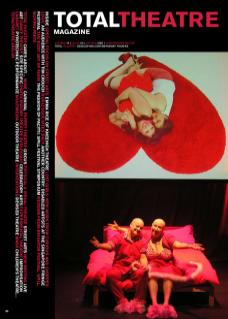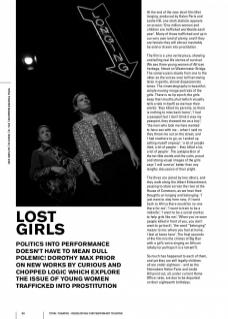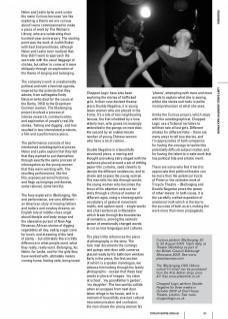At the end of the new short film (Be) longing, produced by Helen Paris and Leslie Hill, one stark statistic appears on screen: ‘One million women and children are trafficked worldwide each year’. Many of those trafficked end up in our very own land of plenty; and if they are female they will almost inevitably be sold or drawn into prostitution.
The film is a cine verité piece, showing and telling real life stories of survival. We see three young women of African heritage, filmed on Westminster Bridge. The camera pans slowly from one to the other as the voices-over tell harrowing tales in gentle, almost dispassionate tones. The cinematography is beautiful; simple moving-image portraits of the girls. There is no lip synch; the girls keep their mouths shut (which visually tells a tale in itself) as we hear their words: ‘they killed my parents, so there is nothing to miss back home’; ‘I had a passport but I don’t think it was my passport, they dressed me as a boy’; ‘the men who took me here wanted to have sex with me – when I said no they threw me out on the street, and I had nowhere to go, so I ended up selling myself anyway’; ‘a lot of people died, a lot of people – they killed a lot, a lot of people’. The juxtaposition of the terrible words and the calm, proud and strong visual images of the girls says ‘I will survive’ better than any lengthy discussion of their plight.
The three are joined by two others, and they walk along the Albert Embankment, pausing to stare across the river at the House of Commons, as we hear their thoughts on longing and belonging: ‘I just want to stay here now, if I went back to Africa there would be no-one there for me’; ‘I want to train to be a midwife’; ‘I want to be a social worker, to help girls like me’; ‘When you’ve seen people killed in front of you, you don’t want to go back’; ‘the word “belonging” means to me: where you feel at home. I feel at home here’. The final seconds of the film mix the chimes of Big Ben with a girl’s voice singing an African lullaby (or perhaps it is a lament?).
So much has happened to each of them, and yet they are still legally children: all are under eighteen – and as the filmmakers Helen Paris and Leslie Hill point out, all, under current Home Office rules, are due to be deported on their eighteenth birthdays.
Helen and Leslie (who work under the name Curious because ‘we like exploring a theme we are curious about’) were commissioned to make a piece of work by The Women’s Library, who are celebrating their hundred-year anniversary. The starting point was the work of Judith Butler with East End prostitutes, although Helen and Leslie soon realised that they didn’t want to approach the sex trade with the usual baggage of clichés, but rather to come at it more obliquely through an exploration of the theme of longing and belonging.
The company’s work is unashamedly political and with a feminist agenda, inspired by the activists that they admire, from suffragette Emily Davison (who died for the cause at the Derby, 1913) to the Greenham Common women. The (Be)longing project involved a process of intense research, communication, and exploration of people’s real life stories, ‘fishing and digging’, and has resulted in two interrelated products, a film and a performance piece.
The performance consists of two intertwined autobiographical pieces. Helen and Leslie explain that they felt that they wanted to put themselves through exactly the same process of interrogation as the young women that they were working with. The resulting performance, like the film, exposes personal histories, and flags up longings and desires, some rational, some fanciful.
The lives explored in (Be)longing, film and performance, are very different – an American story of missing fathers and trailers and cowboy dreams; an English tale of middle-class angst about lifestyle and body image and the obsessive pursuit of New Age Nirvanas; African stories of digging vegetables all day, eating sugar cane for lunch, and dreaming of the land of plenty – but ultimately there is little difference in what people want, what they really, really want. Belonging, for, Helen, for Leslie, and for the girls they have worked with, ultimately means coming home, feeling safe, being loved.
Chopped Logic have also been exploring the stories of trafficked girls. In their new devised theatre piece Double Negative, it is young Asian women who are placed in the frame. It’s a tale of two neighbouring houses, the first inhabited by a lone elderly man, who grows increasingly embroiled in the goings-on next door, the second by an indeterminate number of young Chinese women who have a lot of visitors…
Double Negative is a beautifully structured piece, a moving and thought-provoking story staged with the audience placed around a set of drifting paper-thin curtains, used cleverly to denote the different residences, and to shade and expose the young women. The man tells his tale through words; the young woman who becomes the focus of his attention acts out her story through a chorus of women of different ages, using a choreographic vocabulary of gestural movement motifs, and spoken word – single words and short sentences in Mandarin which break through the boundaries of semantics, proving the semiotic power of emotionally charged words to cut across languages and cultures.
The play’s title references the place of photography in the story. The lone man documents the comings and goings next door with cameras placed ready by his bathroom window. Early in the piece, the first section of which is a spoken monologue, we witness him looking through his family photographs – except that these bear words in place of images: ‘my class at school’, ‘my grandfather’s garden’, ‘my daughter’. The two worlds collide when an escapee from next door takes refuge in his house, and in a moment of beautifully enacted cultural miscommunication and confusion, the man shows the young woman his ‘photos’, attempting with more and more words to explain what she is seeing, whilst she stares and nods in polite incomprehension at what she sees.
Unlike the Curious project, which stays with the autobiographical, Chopped Logic use a fictional narrative to tell their tale of lost girls. Different strokes for different folks – there are many ways to tell true stories, and I’m appreciative of both companies for having the courage to tackle this potentially difficult subject matter, and for having the talent to create work that has political bite and artistic merit.
There are some who find it hard to appreciate that political theatre can be more than the polemical tracts of Pinter or the verbatim work of Tricycle Theatre – (Be)longing and Double Negative prove the power of other means. In both cases, it is the carefully crafted exposition of emotional truth which is the key to the success of both as art, making the work more than mere propaganda.
Curious perform (Be)longing 20 to 25 August 2007, 10pm daily, at Theatre Workshop as part of the British Council Edinburgh Showcase 2007. See www.placelessness.com The (Be)longing DVD (35mm colour/10 mins) can be purchased from the Arts Admin shop, price £7. See www.artsadmin.co.uk Chopped Logic perform Double negative for three weeks in October 2007 at Oval House Theatre, London. See www.choppedlogic.co.uk


